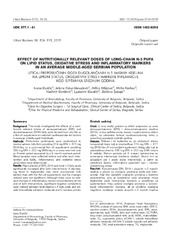Приказ основних података о документу
Effect of nutritionally relevant doses of long-chain N-3 pufa on lipid status, oxidative stress and inflammatory markers in an average middle-aged serbian population
| dc.creator | Đuričić, Ivana | |
| dc.creator | Kotur-Stevuljević, Jelena | |
| dc.creator | Miljković, Milica | |
| dc.creator | Kerkez, Mirko | |
| dc.creator | Đorđević, Vladimir | |
| dc.creator | Đurasić, Ljubomir | |
| dc.creator | Šobajić, Slađana | |
| dc.date.accessioned | 2019-09-02T11:47:48Z | |
| dc.date.available | 2019-09-02T11:47:48Z | |
| dc.date.issued | 2015 | |
| dc.identifier.issn | 1452-8258 | |
| dc.identifier.uri | https://farfar.pharmacy.bg.ac.rs/handle/123456789/2431 | |
| dc.description.abstract | Background: This study investigated the effects of a nutritionally relevant intake of eicosapentaenoic (EPA) and docosahexaenoic (DHA) fatty acids derived from oily fish or a fish oil supplement on selected cardiovascular risk factors in average middle-aged individuals. Methods: Thirty-three participants were randomized to receive salmon (oily fish) providing 274 mg EPA + 671 mg DHA/day or a commercial fish oil supplement providing 396 mg EPA + 250 mg DHA/day in a cross-over trial over an 8-week period separated by a 6-month washout period. Blood samples were collected before and after each intervention and lipids, inflammatory and oxidative stress parameters were determined. Results: Plasma levels of EPA, DHA and total n-3 fatty acids significantly increased after both interventions. A decreasing trend in triglycerides was more pronounced with salmon than with the fish oil supplement, but the changes noticed were not significant. Although there were no relevant changes in inflammatory marker concentrations at the end of both interventions, significant negative correlations were noticed between total plasma n-3 fatty acids and soluble intercellular adhesion molecule and C-reactive protein throughout the whole intervention period (p lt 0.05). Among the oxidative stress parameters, intervention with salmon showed a prooxidative effect through a superoxide anion increase (p = 0.025). A relevant positive correlation was also found between its concentration and total plasma n-3 fatty acids (p lt 0.05). Other oxidative stress markers were not significantly influenced by the dietary interventions applied. Conclusions: Following two sets of recommendations for n-3 fatty acids intake aimed at the general public had only a moderate effect on the selected cardiovascular risk factors in average healthy middle-aged subjects over a short-term period. | en |
| dc.publisher | Društvo medicinskih biohemičara Srbije, Beograd i Versita | |
| dc.relation | info:eu-repo/grantAgreement/MESTD/Integrated and Interdisciplinary Research (IIR or III)/46001/RS// | |
| dc.relation | Pharmanova d.o.o., Belgrade, Serbia | |
| dc.rights | openAccess | |
| dc.source | Journal of Medical Biochemistry | |
| dc.subject | n-3 fatty acids | en |
| dc.subject | fish and fish oil supplements | en |
| dc.subject | circulating inflammatory markers | en |
| dc.subject | oxidative stress | en |
| dc.subject | cardiovascular disease | en |
| dc.title | Effect of nutritionally relevant doses of long-chain N-3 pufa on lipid status, oxidative stress and inflammatory markers in an average middle-aged serbian population | en |
| dc.type | article | |
| dc.rights.license | ARR | |
| dcterms.abstract | Ђурасић, Љубомир; Котур-Стевуљевић, Јелена; Ђорђевић, Владимир; Керкез, Мирко; Миљковић, Милица; Шобајић, Слађана; Ђуричић, Ивана; | |
| dc.citation.volume | 34 | |
| dc.citation.issue | 3 | |
| dc.citation.spage | 304 | |
| dc.citation.epage | 313 | |
| dc.citation.other | 34(3): 304-313 | |
| dc.citation.rank | M23 | |
| dc.identifier.wos | 000358329200005 | |
| dc.identifier.doi | 10.2478/jomb-2014-0039 | |
| dc.identifier.pmid | 28356841 | |
| dc.identifier.scopus | 2-s2.0-84938311583 | |
| dc.identifier.fulltext | https://farfar.pharmacy.bg.ac.rs//bitstream/id/1120/2429.pdf | |
| dc.type.version | publishedVersion |

